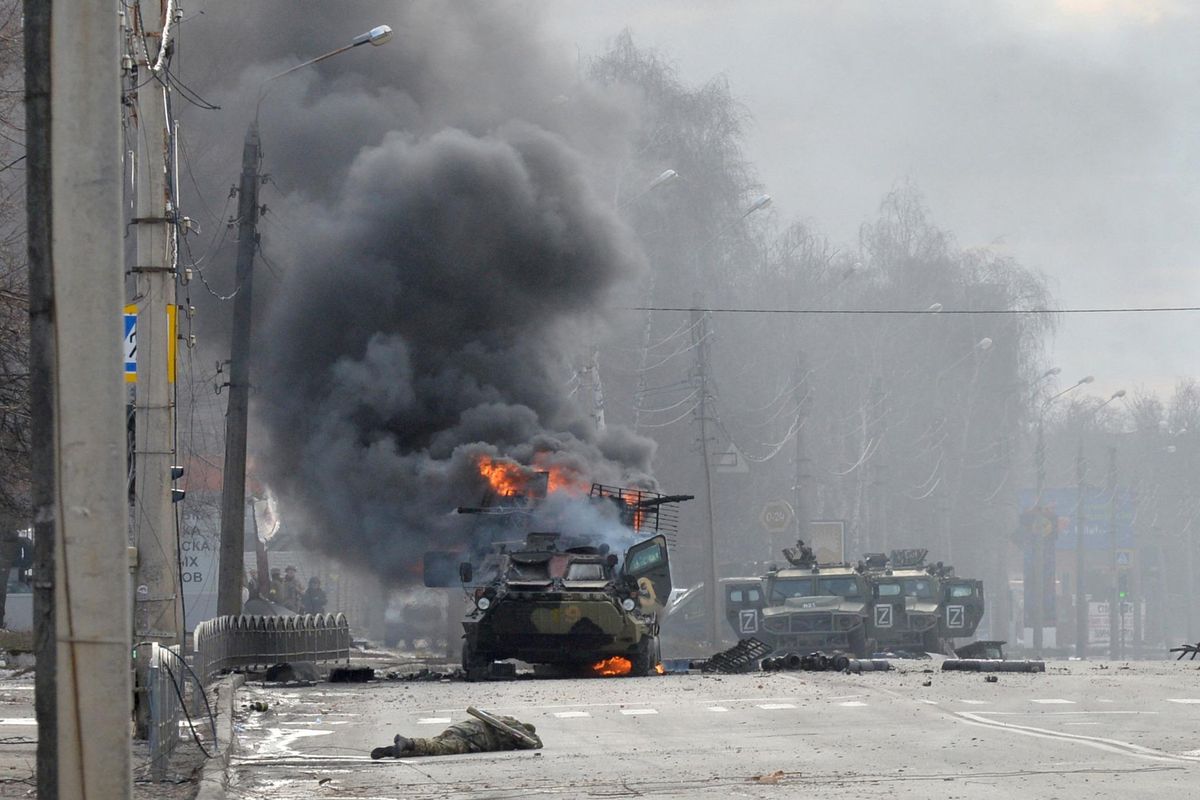The United States and its allies are now at war with Russia.
American troops may not—and most assuredly will not—be on the ground in Ukraine, but the US and NATO allies are sending Ukrainians an enormous amount of the world’s most sophisticated war-fighting equipment, not just to help them defend themselves but to help them kill Russians more effectively. Yes, Russian President Vladimir Putin started the war when he invaded Ukraine without provocation. But in the eyes of the Kremlin, vastly more Russians will come home in body bags as a direct result of NATO’s intervention.
The United States and its allies are also imposing crushing financial sanctions on Russia—including blocking Russian banks from the global messaging platform SWIFT and freezing its central bank reserves—in an explicit attempt to cripple the country’s economy and force Moscow to capitulate or, barring that, to foment regime change. While actively bringing down the Russian government may not be a stated goal of Western sanctions, Putin sees it that way.
Want to understand the world a little better? Subscribe to GZERO Daily by Ian Bremmer for free and get new posts delivered to your inbox every week.
Western leaders do not believe that they’ve declared war against the Russians; the Kremlin believes that they have, and unjustifiably so. However laughable you might find the Russian perspective, this misalignment of understanding over what’s happening is dangerous.
For a man like Putin who has spent several years in isolation, surrounded only by sycophants, and for whom things are currently not going as well as he expected, this perceived existential threat to his regime—and to his own survival—makes it more, not less, likely that he will lash out in return. That could mean anything from staging more false-flag attacks as a pretext to massacre Ukrainian civilians, to conducting major cyberattacks on US and European critical infrastructure, to unilaterally cutting off Europe’s energy supply, to threatening nuclear use (again). In other words, the sorts of desperate steps that are deeply escalatory and hard to come back from.
Western leaders need to understand that the kind of fight they’re bringing to Russia—a country that may not have the largest economy but whose military and nuclear capabilities are still top 3 in the world—could have very significant knock-on implications for global security, far beyond its effects on global markets. Given the potential for miscalculation, backing an unpredictable autocrat into a corner is a risky bet.
To be clear, I am not recommending that the West leave Putin alone. We most certainly should not do that. What I am saying is that we need to be deliberate in our response and consider not only what Putin deserves but also how he might react, lest we increase the risk of major escalation. When Putin orders Russia’s nuclear forces onto high alert in response to NATO statements and sanctions, we need to take that seriously. Not in the sense that we should fold to avoid triggering him or go all DEFCON 1 ourselves, but rather that we need to be cautious not to precipitate what could be another Cuban Missile Crisis.
“It’s not that we should be intimidated and scared,” former US National Security Council official and long-time Putin expert Fiona Hill told POLITICO recently. “We have to prepare for those contingencies and figure out what is it that we’re going to do to head them off.”
The good news is that the United States and Europe are much more motivated and aligned than they have been in ages. As former CIA boss David Petraeus put it to me, Putin has “given NATO a reason to live again.” The EU today is unspeakably stronger today than it was two weeks ago. Germany has gone from shy pacifist to providing lethal weapons and doubling its defense spending. Finland is considering doing away with its long-standing neutrality in favor of joining NATO. Putin admirer Viktor Orban’s Hungary supported the bloc’s sanctions. Even historically hands-off nations like Monaco and Switzerland are getting into the act. For the first time since 1991, the trans-Atlantic alliance has clarity of purpose. All of this makes it much harder for President Putin to get a win.
But preventing Russia from winning is not necessarily the same as winning ourselves. After all, there are such things as lose-lose situations. All it takes is a spoiler—a role Putin has been playing to perfection for two decades.
That’s the bad news: might Putin rather burn the world down than accept defeat? As he ominously warned back in 2018 and Russian state media recently reiterated, “Why do we need a world if Russia is not in it?” That leads me to think that, at least for now, we're heading towards more escalation in Ukraine. Meaning a lot more troop deployments, a lot more bombings, and a lot more civilian casualties. And the worse that escalation gets, the more the relationship between the US, Europe, and Russia will be broken irreparably.
For the last 30 years, we've been reaping a peace dividend from the end of the Cold War, one that all nations benefited from. That peace dividend is gone now. What does that mean? How much is that going to hurt us? We're about to find out.
🔔 And if you haven't already, don't forget to subscribe to my free newsletter, GZERO Daily by Ian Bremmer, to get new posts delivered to your inbox.



















